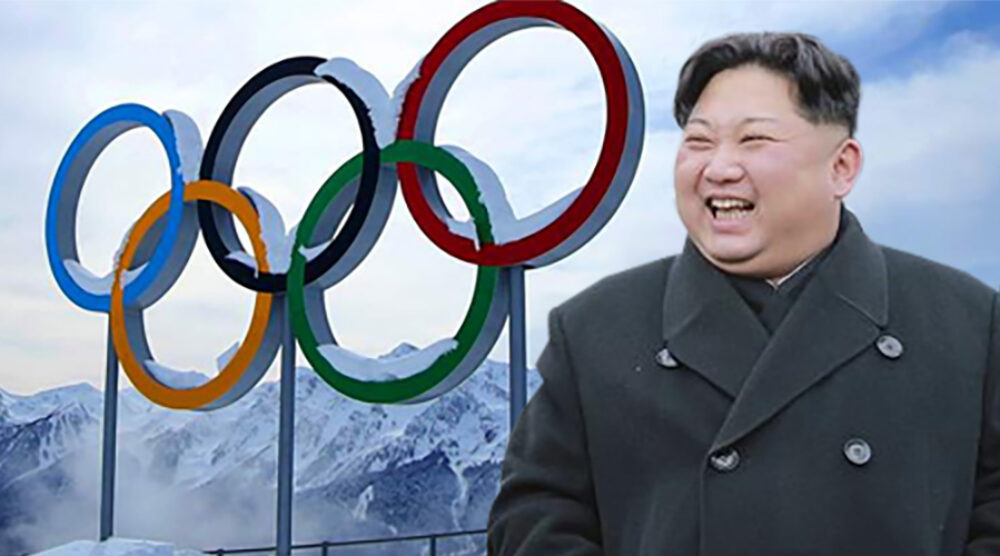Sport, it would seem, has paved the way for limited but significant diplomatic success on the Korean Peninsula. The Pyeongchang Winter Olympics, due to begin next month provided the backdrop for the first official talks to be held between North and South Korea since 2015. North Korea’s participation in the Games was the primary agenda item.
As an exercise in diplomatic communication, the latest inter-Korean talks were a resounding success. There is no mechanism in place for formal communication between the estranged Koreas. The usual diplomatic channels simply don’t exist, and the communications hot-line between the two has been inactive since early 2016. In recent years the only way to get messages across is literally to shout through loudhailer across the Demilitarized Zone (DMZ).
South Korea’s President Moon Jae-In has been looking for a way to break through with Pyongyang amid escalating hostilities on the Peninsula, and the Winter Olympics provided the right inducement. When Kim Jong Un flagged North Korea’s interest in the Games during his New Year Oration, it was a signal not missed. The talks were then arranged and took place in Peace House on South Korea’s side of the DMZ just over a week later.
In terms of negotiation, North Korea’s agreement to send a delegation of athletes, cheerleaders, artists, journalists and high level officials to the Games signal further diplomatic success. The suggestion that Korean athletes might walk together under a single Korean flag (as they did at the opening ceremony of the Sydney 2000 and Athens 2004 Olympics) bodes well for the sporting event that South Korea’s Minister of Unification Cho Myoung Gyon has dubbed a “festival of peace.”
While further details of the closed-door negotiations remain sketchy, it appears that agreement was reached on a range of other important issues: the scheduling of a further round of inter-Korean talks, the reinstatement of the telephone hot-line, (facilitating the arrangement of those talks), and the possibility of a family reunion in the Lunar New Year.
As a means of representation, the Winter Olympics present an important opportunity for both North and South Korea on the world stage. Staging a mega-sporting event, like the Olympic Games is a massive investment in nation branding. For South Korea, delivering a smooth, safe and welcoming Games event, amid increasing talk of war on the Korean Peninsula, is critical. For North Korea, the stakes are also high. Despite biting sanctions, North Korea has continued to invest heavily in its elite athlete programs. Much will be riding on the performance of ice-skating medal hopefuls Ryom Tae-ok and Kim Ju-sik and the cheerleading squads prepared to urge them on.
In terms of functional diplomatic practice, the latest inter-Korean talks were a success. They delivered opportunities for representation, improved communication, negotiated outcomes, and friendly exchange between the two Koreas.
But do they hold greater significance? Some suggest the talks might pave the way for renewed diplomatic discussion on the denuclearisation of the Korean Peninsula. It’s a long bow to draw. But diplomacy is a funny business, and small confidence building steps can, over time, deliver surprising outcomes. Sport and sporting events, in particular can be powerful enablers of diplomacy – building or shifting public opinion in ways that influence the political environment and facilitate new policy outcomes.
But, caution is warranted in this instance. There are other complexities at play, particularly when it comes to North Korea’s longer-term motivations, and the warning signs are already there.
Firstly, concessions pushed by South Korea to ensure North Korea’s participation in the Games—including the halting of the regular joint military exercises during the Games timeframe and the temporary lifting of travel sanctions on some high-level officials—open the way for North Korea to undermine the wider diplomatic strategy of ‘maximum pressure’ against them. This is particularly the case as the latest round of economic sanctions bite hard against the regime, and it in turn, seeks out opportunities for relief.
Secondly, Inter-Korean cooperation presents an opportunity for North Korea to leverage the discord that has emerged between South Korea’s President Moon and US President Trump and destabilize the South Korean-US alliance. Some suggest this is at the core of Kim Jong Un’s longer game. President Moon has continued to express solidarity with US policy towards Pyongyang, but as Daniel Sneider writes, Moon “worries greatly about the threat of American military action against the North, and shares the public perception of American unreliability, fueled by President Donald Trump’s careening tweets.”
Moon publicly credited Trump for creating the political conditions for the inter-Korean talks in a move many suggest was aimed at easing US concern about the state of the alliance. Yet Trump’s tweet claiming personal credit and reaffirming “total US might against the North,” which followed on from an earlier tweet boasting that his nuclear button is “bigger and more powerful” than Kim Jong Un’s, simply reinforces the fundamental disconnect between the two allied leaders.
Lastly, North Korea has given no indication that it will slow down or step away from its nuclear weapons program. To the contrary, in his New Year address Kim Jong Un talked with confidence about plans to continue to strengthen North Korea’s nuclear weapons research sector and rocket industry. While noting the defensive nature of the program, he nonetheless warned that North Korea was capable of striking the US at any moment with nuclear weapons. North Korean officials have since firmly rejected any suggestion that they would be drawn into talks about the nuclear program.
So, while a notable success in diplomatic terms, the significance of inter-Korean talks is limited. Much depends on the development of further talks, consistent political leadership and the interplay of wider diplomatic interests. Dialogue on denuclearisation is a very long way off.








